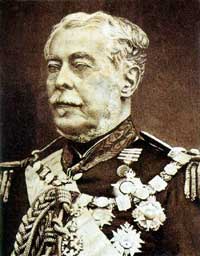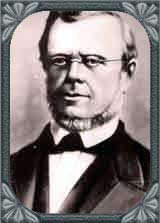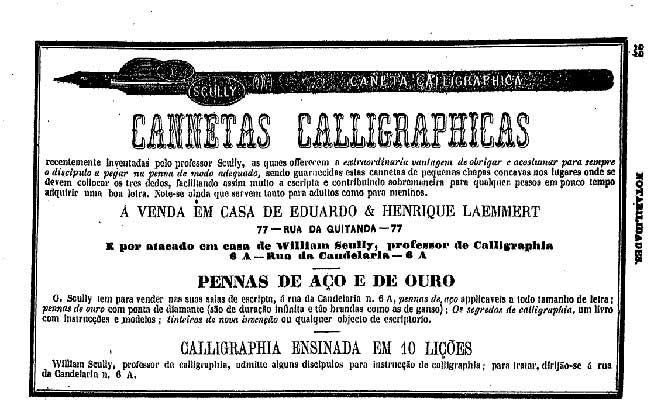|
The Place of the Anglo-Brazilian Times in Brazilian
Political and Socioeconomic Spheres
The date 16 July 1868 was a turning point
in the political history of the Brazilian Second Empire, a
point of departure from which a process of disintegration of
the monarchical regime was initiated. On that day, Joaquim
José Rodrigues Torres (1802-1872), Viscount of Itaboraí, of
the Conservative Party, was appointed Prime Minister in place
of the progressive, Zacarias de Góes e Vasconcelos. It was the
third time that Zacarias had led the Cabinet.
Inaugurated
on 3 August 1866, the last cabinet of Zacarias had a legitimate
Liberal-progressive parliamentary majority. The progressives
were a faction of the Conservative Party, which included
radical Catholics, known as Ultramontanes. The
political aspirations of these last were aimed at the
extinction of the politico-religious prerogatives of the
Emperor, ensured by the 'padroado' (patronage) and the
'beneplacito' (approval) systems, which made Dom Pedro
II the effective leader of the Brazilian Church. Regulations
emanating from the
Vatican had
validity in the country only with the approval of the monarch.
Zacarias was an eloquent politician with an Ultramontane
religious background and became the natural leader of that
unlikely political majority which united Liberals,
ex-Conservatives (progressives) and Ultramontanes.
The reason
behind that compatibility, as David Gueiros Vieira has well
highlighted in his work on the relationship between the
freemasonry and the Religious Question of 1872, lay in the
free entry of European Catholics loyal to the Vatican
(Papists) into the country during the
1860s (Vieria 1980: 245). This might counter-balance,
demographically and politically, the religious prerogatives of
the Emperor. The idea that a congregation would be expanded by
free immigration pleased the Ultramontane clergy and,
naturally, Pope Pius IX. Therefore, both the Roman Catholic
Church and its legitimate representatives in Brazil supported
initiatives aimed at the liberalisation of the immigration
policy, provided that Catholics were favoured. Hence the
affinities between Liberals and Ultramontanes in the second
half of the nineteenth century in Brazil and the composition
of the parliamentary majority represented by the Third of
August Cabinet. However, this coalition, for the reasons
exposed below, did not prosper. [4]
The political
commotion of July 1868 was serious enough to provoke the
rupture of the equilibrium of the Brazilian political life and
national parties. Alfredo Bosi, for example, observes that the
Brazilian historiography '[...] is unanimous in pointing to
the year 1868 as the great watershed between the most stable
period of the Second Empire and the long crisis which would
culminate, twenty years later, in the Abolition [of slavery]
and the [proclamation of the] Republic' (Bosi 1999: 222). The
foundation of the Republican Party would occur just two years
after 1868. During the two subsequent decades, the combination
of various other movements, among them Abolition and
the expansion of Positivism (especially within the Armed
Forces), produced the end of the monarchical regime.
Therefore, it is not an exaggeration to affirm that the
removal of the Third of August Cabinet was the historical
event that set in motion the forces that led to the birth of
the Republic, which occurred on 15 November 1889.
|

The Duke of Caxias, Patron of the Army.
Pinto de Campos, J., Vida de Luís Alves
de Lima e Silva (Lisboa, 1878) |
The events
leading up to the crisis of 16 July 1868, for their part, had
a direct relationship with the Paraguayan War (1864-1870). The
Brazilian command of the military operations of the Triple
Alliance (Argentina, Brazil and Uruguay), under the orders of
Marshall Luís Alves de Lima e Silva (the then Marquis of
Caxias), was, at the beginning of that year, harshly
criticised in the Liberal press, most markedly in a series of
diatribes by William Scully in the Anglo-Brazilian Times
of 7 January.
In view of
these criticisms, Caxias presented a request for renunciation,
in February 1868. Under these circumstances, Dom Pedro II was
left to choose between: 1) preserving the supreme leadership
of the Brazilian and Allied military forces at war, or 2)
conserving the Third of August Cabinet. Caxias ended up
forcing the removal of Zacarias, who asked for exoneration on
the pretext of the nomination of the Conservative Francisco de
Sales Torres Homem (1812-1876), of Rio Grande do Norte, to the
Senate (Vieria 1980: 248-250). A new government was
subsequently formed, with the leadership of Conservatives. The
change, by force, which was widely regarded as a coup d'état,
was made possible because the Emperor enjoyed the power of a
moderator and thus was constitutionally capable of interfering
in the normal political process. The new Conservative
leader, Itaboraí, was sworn in without an elected majority.
Only then were elections called and of course the
Conservatives won most constituencies, thereby lending a
veneer of legitimacy to the 16 July Cabinet.
Significant
authors, such as Batista Pereira (1975: 36-38), Sérgio Buarque
de Holanda (1972-2, v. 5: 7-13, 95-104), Brasil Gerson (1975:
127-131), Wilma Peres Costa (1996: 251-254) and, more
recently, Francisco Doratioto (2002: 334-339), point to The
Anglo-Brazilian Times as the principal vehicle for
Liberal propaganda against Caxias in 1868. According to the
proprietor of that paper, William Scully, the Brazilian
marshal was too old to carry out the task conferred upon him,
that of defeating Solano López, the Paraguayan head-of-state.
In an allusion to Republican Rome, Caxias was, in the
Irishman's words, a 'septuagenarian Cincinnatus'. Furthermore
- which was even more serious - Scully accused Caxias of
forcing 'the war [...] to linger on as long as the country can
find the gold to squander.' In his view, the Brazilian
marshal's 'favorite weapons' were 'gold bags,' thereby evoking
an image of trenches guarded by such devices. Consequently,
the moroseness with which, towards the end of 1867, military
operations on the Paraguayan front had actually been conducted
was portrayed as intentional.
The
accusations made by William Scully were of impropriety and
corruption. Yet these aspects of his article have not been
appropriately highlighted, in spite of the fact that it has
been recognised that his criticisms initiated the crisis that
precipitated the decline of the
Second Empire. All this said, the majority of the secondary
sources, with the exceptions of David Gueiros and Oliver
Marshall, do not mention any prior activity in which the Irish
editor was involved. The impression given by the analyses of
the authors mentioned above is that of the Anglo-Brazilian
Times surging onto the Brazilian political scene of 1868
like a lightning bolt from out of the blue. This newspaper was
however founded in early 1865, in
Rio de
Janeiro. The office was firstly located in Rua do Hospício
(present-day Buenos Aires Street). Scully, although a
journalist, was also an empresario connected with the
business of immigration. The paper had support bases on Fleet
Street in London, the traditional location of the offices of
the newspapers of the English capital, and also in Liverpool.
As for the year of Scully's arrival in Rio, it appears to have
been 1861, when he established himself in the Brazilian
capital as a teacher of calligraphy (Laemmert 1862: 478, and 'Notabilidades'
22). [5]
In 1865,
diplomatic relations between Brazil and England had been
suspended, because of the many disagreements between the
Minister Plenipotentiary William Christie and the Brazilian
Government. The most important of these related to the destiny
of the Africans who had entered Brazil under the protection of
agreements between the two countries. These agreements dated
back to 1826 and to a Brazilian law of 1831, which actually
declared illegal the transatlantic trade in slaves. In
practice however, the smuggling of enslaved Africans into
Brazil continued to be rampant long after 1831. In legal
terms, all Africans forced to immigrate to Brazil after 13
March 1830 were freedmen ('emancipados') and were to be either
repatriated or held in custody by the State. Africans legally
seized by the military under the bilateral agreements and
retained in the custody of the Brazilian authorities were also
'emancipados,' and yet they had been reduced to slavery. Even after the total
suspension of the Atlantic slave trade, in 1850, the
governmental lists containing the names of the 'emancipados'
were kept undisclosed. The tremendous pressures exerted by
Christie to force Brazil to liberate the 'emancipados'
and to produce the lists with their names was the true reason
for the suspension of relations.
Ironically,
Anglo-Brazilian diplomatic relations broke off after a number
of events of minor importance, totally unrelated to the
problem of the 'emancipados': the stolen cargo of a
British ship that had sunk on the southern coast of Brazil,
and the imprisonment of drunken English sailors following an
isolated altercation in Rio de Janeiro. Demanding exorbitant
compensation for these minor transgressions, Christie ordered,
on 31 December 1862, the blockade of the
Port of
Rio de Janeiro,
and the seizure of Brazilian ships. In May of the following
year, official relations between the Brazilian and British
governments were cut off (Bethell 1970: 70, 380-383). [6]
It can
logically be assumed that the establishment of Scully's
newspaper received financial support from the British Crown,
at a time when relations between Brazil and England were still
suspended. It must be kept in mind that the work of Francisco
Otaviano de Almeida Rosa (1825-1889) in the Correio
Mercantil had been subsidised by the British Legation, a
fact highlighted by Leslie Bethell and David Gueiros (Vieira
1980: 90). [7] What would have prevented Britain from
supporting financially a newspaper belonging to a British
subject established in Brazil? Nothing, one might say.
However, much greater attention is given to the fact that
the Third of August Cabinet was accused of subsidising
Scully's newspaper, which was true and certainly explained by
the politico-religious interests connecting one to the other.
[8]
Assuming that
somehow
Britain
actually channelled financial resources into the maintenance
of a quasi-official newspaper, directed by a British subject,
established in
Rio and dedicated to the propaganda of free immigration, we have
an indication of a radical shift in the country's diplomatic
relations with
Brazil.
The aggressive, aristocratic, Palmerstonian style of
implementation of its foreign policy vis-à-vis Brazil
('gun-boat' or 'canhoneira' policy) was being
abandoned, and the British imperative of the extinction of
slave labour would be implemented, right in the capital of the
Brazilian Empire, by way of the more subtle pressure of
liberal journalistic propaganda. [9] The colonialist features
of that propaganda, however, appear to have frustrated the
initiative.
The evidence
which justifies these hypotheses is contained in Scully's
discourse in the Anglo-Brazilian Times between 1865 and
1870. The newspaper openly divulged, from its first edition on
7 February 1865, the promotion of spontaneous mass European
immigration as a method of rendering slavery obsolete and
boosting demographic growth in Brazil.
The fact that Scully was directly involved in the most
significant political crisis of the history of the Second
Empire would be sufficient to attest to the extent of the
circulation and the influence of the Anglo-Brazilian Times.
Nevertheless in his recent book on this subject, Oliver
Marshal maintains that the articles written by Scully were
translated and published in the local press in
Rio. Therefore,
it can be assumed that the editions previous to 1868 had had a
significant circulation, being read by members of the
Brazilian political and military elites. There were also many
subscribers abroad, a circumstance which certainly placed the
image of the country permanently under the spotlight (Marshall
2005: 28).
The most
characteristically colonialist features of Scully's newspaper,
along with his insistent suggestions of the Brazilian
governmental adoption of liberal directives in immigration
policy, are found precisely in the editions prior to 1868. A
quick appraisal of some passages suffices to perceive its
authoritarian profile, despite its seeming, in comparison to
the gunboat policy, a gentler form of pressure.
Scully's Colonialist Discourse
The aggressiveness and
forcefulness of Scully's texts were evident from the first
months of his editorial activity. His writings do not sound
like those of an independent journalist. Rather, they can be
construed as a discourse that was backed up by an
interventionist power. Dealing with themes and issues of major
relevance for the Brazilian elites, he demonstrated
extraordinary impatience. His texts evince, equally, a
tremendous disdain for those same elites, although he always
praised and attempted to cajole the monarch, Dom Pedro II, and
his family. [10]
|




